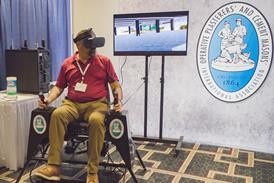EXCLUSIVE: In a move to allay French fears about forthcoming free trade talks with the US, the EU’s Education and Culture Commissioner Androulla Vassiliou has outlined her position publicly for the first time.
Speaking to Screen, Vassiliou said the European Commission (EC) recognised “that there are concerns and sensitivities, which have been expressed by President Hollande, among others, notably as regards the audiovisual sector.”
At last week’s EU leaders summit in Brussels, Hollande had addressed the issue of the ‘cultural exception’ and demanded that the sector of audiovisual services “like with other agreements, cannot be part of the [negotiation] mandate. I want these areas to be excluded from the negotiation.”
No change to cultural exception
“Let me be clear,” Vassiliou explained. “The European Commission has a single view on this: there will be no change to the current system of ‘the cultural exception’. The Commission – like Members States including France – recognises the importance of our cultural diversity.”
She pointed out that the EU had obligations, as enshrined in Article 167 of the Lisbon Treaty, “to protect cultural diversity so this will always be borne in mind in our future trade negotiations and exchanges.”
“Culture is not a ‘product’ like any other: culture has an intrinsic value in itself and, in many cases, it also has an economic value,” the Commissioner continued. “We understand this and will take account of this specific dual nature.”
“Trade liberalization will not weaken those policies and measures at EU level, or in the Member States, which safeguard and promote cultural diversity, notably in terms of film and television programming.”
Impact of new technologies
She added that she was aware of “particular concerns about the impact of new technologies in the audiovisual sector and how this will affect our commitment to cultural diversity.”
“Let me be equally clear on this point: in the future, we will and must continue to promote our cultural diversity as technologies develop. That is what the Treaty requires. We must also recognise that Europe must position itself to seize the opportunity that future technological developments may present for the European audiovisual industry. Let us use our cultural diversity as strength.”
‘Game-changer’ deal
Vassiliou suggested that a future trade and investment agreement between the EU and US would be “a ‘game-changer’, giving a strong boost to our economies on both sides of the Atlantic, and could also lead to an estimated 1.3m more jobs in the EU and 520,000 more in the US.
Quoting from a report prepared for the EC by the London-based Centre for Economic Policy Research on reducing transatlantic barriers to trade and investment, she noted declared that a “transatlantic economic alliance” could bring significant economic gains as a whole for the EU – estimated at $153.6 bn (€119bn) a year - and for the US around $122.7bn (€95bn) a year once the agreement is fully implemented.
This would translate, according to the policy centre, to an extra - on average - $704 (€545) in disposable income each year for a family of four in the EU
The EU Council of Trade Ministers, representing the 27 member states, is expected to agree a mandate for the EC to start negotiations with the United States on 14 June in the final weeks of the Irish EU Presidency.
Survey deadline extended
In a separate development, the EC’s Europe for Creativity online survey about access to finance for the cultural and creative sectors (CCS) has been extended to March 30.
In a web conference, Isabella Tessaro, policy officer at the MEDIA Programme unit in Brussels, said that she was “very positive that [the survey] will allow us to build a better case for the instrument and to define more precisely how much credit is needed, the size of the guarantee fund, and how it should work.”
She revealed that there had been very high response rates from France, Belgium and Germany, but “very few” responses from the UK, Slovenia, Slovakia, Portugal, Poland, Ireland and Hungary, and no responses at all - at the time of the web conference - from Bulgaria, Cyprus, Greece or Latvia.
Tessaro, who has been working on the design of a new guarantee facility as part of the future Creative Europe framework programme, explained that the average time for filling out the survey – at http://eu-for-creativity.eu - “is between seven and eight minutes.”


















![2026_FORUM_LETTER TO ALVIN_Main still[59]](https://d1nslcd7m2225b.cloudfront.net/Pictures/100x67/6/9/5/1469695_2026_forum_lettertoalvin_mainstill59_712728_crop.jpeg)




No comments yet